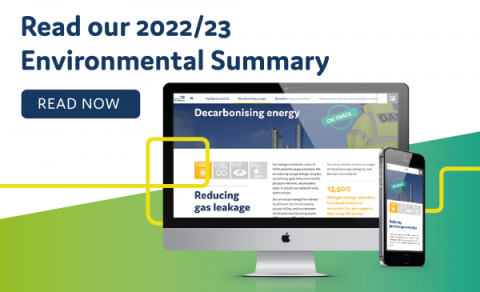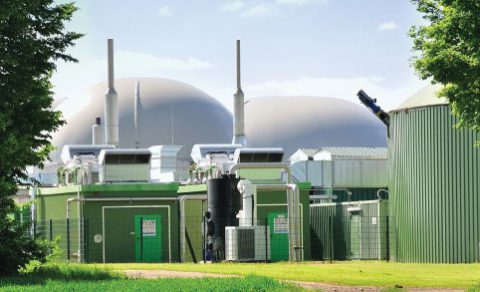The gas is greener
Keeping 2.9 million homes and businesses cooking on gas is a resource intensive business. It’s our responsibility to reduce our day-to-day carbon footprint, while helping green, alternative fuels to flourish.
We use cookies to help you navigate efficiently and perform certain functions. You will find detailed information about all cookies under each consent category below.
The cookies that are categorized as "Necessary" are stored on your browser as they are essential for enabling the basic functionalities of the site. ...
Necessary cookies are required to enable the basic features of this site, such as providing secure log-in or adjusting your consent preferences. These cookies do not store any personally identifiable data.
Functional cookies help perform certain functionalities like sharing the content of the website on social media platforms, collecting feedback, and other third-party features.
Analytical cookies are used to understand how visitors interact with the website. These cookies help provide information on metrics such as the number of visitors, bounce rate, traffic source, etc.
Performance cookies are used to understand and analyze the key performance indexes of the website which helps in delivering a better user experience for the visitors.
Advertisement cookies are used to provide visitors with customized advertisements based on the pages you visited previously and to analyze the effectiveness of the ad campaigns.
Other cookies are those that are being identified and have not been classified into any category as yet.
If you smell gas, have low gas pressure, no gas supply or suspect carbon monoxide, call 0800 111 999 at any time of the day or night. Find out more about what to do in a gas emergency or if you suspect carbon monoxide.
Keeping 2.9 million homes and businesses cooking on gas is a resource intensive business. It’s our responsibility to reduce our day-to-day carbon footprint, while helping green, alternative fuels to flourish.

See a summary of our performance against environmental commitments via the link below:
Read NowWe’re working hard to become a cleaner, greener business – reducing waste in our daily operations, and gearing up for a low carbon, sustainable future – targeting our daily operations to be net-zero by 2031.
Our People and Planet Strategy is our roadmap for improvement.

This table takes a detailed look at our environmental performance since the start of the regulatory period from 2013 – 2021, known as RIIO-GD1. Simply click the plus arrow to read a brief commentary on what the statistic means, and see how we performed.
| Gas shrinkage | Target | Status | |
|---|---|---|---|
Shrinkage baseline (GWh)Shrinkage is the industry term for gas lost through leaks on our pipes, plus gas lost through theft, and gas used by us for operational purposes. We were ahead of our target throughout RIIO GD1, by continuing to replace old, leak prone pipes and by effectively managing the pressure of gas passing through the network, to avoid putting unnecessary strain on the pipes. |
379 GWh | Ahead | |
Leakage baseline (GWh)The total volume of gas lost through leaks on the pipe network. This figure is a major contributor to the overall ‘shrinkage’ total (see previous statistic). We exceeded our leakage target throughout RIIO GD1, by continuing to replace old, leak prone pipes and by effectively managing the pressure of gas passing through the network, to avoid putting unnecessary strain on the pipes. |
354 GWh | Ahead | |
Business carbon footprintAlthough no specific business carbon footprint target has been set by Ofgem, all gas distributors are expected to make steady progress. 2020/21 saw us reduce our business mileage and lower our energy consumption in buildings as a result of the Covid-19 pandemic. |
0 | N/A |
| Other emissions and natural resource use | Target | Status | |
|---|---|---|---|
Number of sites where statutory remediation has been carried outIn 2020/21, we continued the process of reviewing our sites, to identify any potential issues with land contamination and identified two sites for remediation.. |
Zero | On target | |
Use of virgin aggregateOur use of virgin aggregate increased in 2020/21 partly due to supply issues with recycled aggregate in Cumbria, and also due to stakeholder demand to meet engineering requirements. Despite this, we still exceeded our internal target and we are proud to announce good progress overall with our usage of virgin aggregate reducing by approximately 61% since 2013/14. |
<17,000 tonnes (internal) | Ahead | |
Amount of spoil to landfillReducing the volume of spoil to landfill has always proved challenging, partly due to high clay content in the spoil created across our network. While we are ahead of our internal target, we are continuing to work with our partners and the wider industry to increase the recycling facilities available. This still proves to be an ongoing challenge and remains an area of focus. |
<13,000 tonnes (internal) | Ahead | |
ISO 14001 major non conformitiesISO 14001 is a family of standards related to environmental management. It helps companies minimise any adverse environmental impact and comply with relevant laws and regulations. |
0 | N/A |
| Biomethane | Target | Status | |
|---|---|---|---|
Total capacity of biomethane connectedNGN are big supporters of biomethane production a clean, sustainable gas formed by the breakdown of organic material, to produce biogas which is then enriched with propane to produce biomethane. Our role is to help biomethane producers get their product into our network, and into customers’ homes. Over the past few years we have seen a decrease in the number of biomethane producers that want to connect to our network, which we believe is as a result of the timescales imposed by the Renewable Heat Incentive (RHI) Regulations announced in May 2018. Under the regulations, new biomethane plants have to flow gas to grid by 31 January 2020 to be eligible for the Tariff Guarantee. |
Annual comparrison with other gas distribution networks | N/A | |
Total capacity of biomethane enquiries/applications in progress (MW)Over the past few years we have seen a decrease in the number of biomethane producers that want to connect to our network, which we believe is as a result of the timescales imposed by the Renewable Heat Incentive (RHI) Regulations announced in May 2018. Under the regulations, new biomethane plants have to flow gas to grid by 31 January 2020 to be eligible for the Tariff Guarantee. |
Annual comparrison with other gas distribution networks. | N/A | |
Information provision and connection charging for distributed gasGetting a biomethane plant connected to the gas network is a complex and demanding process, so provision of clear, timely information about technical requirements and pricing is extremely important. We have a dedicate team providing this service, along with a dedicated website, an introductory brochure and a detailed technical manual, available to all producers. |
No target | N/A | |
Voluntary standards of service: 15 day response to initial enquiry under 7barProvision of clear, timely information about the technical requirements of connecting to our network, and associated pricing, allows prospective biomethane producers to decide if there project is viable. Our dedicated biomethane team handles enquiries promptly. |
100% | On target | |
Voluntary standard of service: 30 day response to capacity study under 7 barProvision of clear, timely information about the technical requirements of connecting to our network, and associated pricing, allows prospective biomethane producers to decide if there project is viable. Our dedicated biomethane team handles enquiries promptly. |
100% | On target |